
"Losing My Religion" is a song by American alternative rock band R.E.M., released in February 1991 as the first single and the second track from the group's seventh album, Out of Time (1991). Built on a mandolin riff, the song was an unlikely hit for the group, garnering extensive airplay on radio as well as on MTV and VH1 due to its critically acclaimed music video. The single became R.E.M.'s highest-charting hit in the United States, reaching No. 4 on the Billboard Hot 100 and expanding the group's popularity beyond its original fan-base. At the 1992 Grammy Awards, "Losing My Religion" won two awards: Best Short Form Music Video and Best Pop Performance by a Duo or Group with Vocal.

Monster is the ninth studio album by American rock band R.E.M., released on September 27, 1994, by Warner Bros. Records. It was produced by the band and Scott Litt and recorded at four studios. The album was an intentional shift from the style of their previous two albums, Out of Time (1991) and Automatic for the People (1992), by introducing loud, distorted guitar tones and simple lyrics.

In Time: The Best of R.E.M. 1988–2003 is the second official compilation album released by R.E.M. Issued in 2003, it includes tracks from their Warner Bros. Records era, from 1988's Green to 2001's Reveal, as well as two new recordings and two songs from movie soundtracks. The album was the tenth-best-selling album of 2003 in the UK, and the 50th-best-selling album of the 2000s in the UK.

New Adventures in Hi-Fi is the tenth studio album by the American alternative rock band R.E.M. It was their fifth major-label release for Warner Bros. Records, released on September 9, 1996, in Europe and Australia, and the following day in the United States. New Adventures in Hi-Fi was the last album recorded with founding member Bill Berry, original manager Jefferson Holt, and long-time producer Scott Litt. The members of R.E.M. consider the recorded album representative of the band at their peak, and fans generally regard it as the band's last great record before a perceived artistic decline during the late 1990s and early 2000s. It has sold around seven million units, growing in cult status years after its release, with several retrospectives ranking it among the top of the band's recorded catalogue.

"Orange Crush" is a song by the American alternative rock band R.E.M. It was released as the first single from the band's sixth studio album, Green, in 1988. It was not commercially released in the U.S. despite reaching number one as a promotional single on both the Mainstream and Modern Rock Tracks. It peaked at number 28 on the UK Singles Chart, making it the band's then-highest chart hit in Britain, where they promoted the song by making their debut appearance on Top of the Pops.

"What's the Frequency, Kenneth?" is a song by American alternative rock band R.E.M. from their ninth studio album, Monster (1994). The song's title refers to an incident in New York City in 1986, when two then-unknown assailants attacked journalist Dan Rather, while repeating "Kenneth, what is the frequency?"
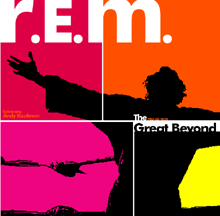
"The Great Beyond" is a song by American rock band R.E.M., written for the 1999 film Man on the Moon. It was released as a single the same year for support of the film's soundtrack album. On the soundtrack, there is some dialogue from the movie at the end of the track; meanwhile, the single version is a radio edit, with the bridge omitted.
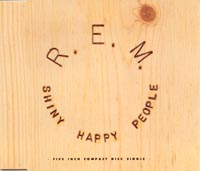
"Shiny Happy People" is a song by the American rock band R.E.M., released as the second single from their seventh studio album, Out of Time (1991). It features guest vocals by Kate Pierson of the B-52's, who also appears in the music video.

"Everybody Hurts" is a song by American rock band R.E.M. from their eighth studio album, Automatic for the People (1992), and released as a single in April 1993. It peaked at number 29 on the US Billboard Hot 100. The song fared much better on the US Cash Box Top 100, where it peaked at number 18. It also reached the top 10 on the charts of Australia, Canada, France, Iceland, Ireland, the Netherlands, and the United Kingdom. Its music video was directed by Jake Scott. In 2003, Q ranked "Everybody Hurts" at number 31 on their list of the "1001 Best Songs Ever". In 2005, Blender ranked the song at number 238 on their list of "Greatest Songs Since You Were Born".

"Man on the Moon" is a song by American alternative rock band R.E.M., released in November 1992 as the second single from their eighth album, Automatic for the People (1992). The lyrics were written by lead singer Michael Stipe, and the music by drummer Bill Berry and guitarist Peter Buck. The song was well received by critics and reached number 30 on the US Billboard Hot 100, number 17 on the US Cash Box Top 100, number 18 on the UK Singles Chart, and number one in Iceland. It remains one of R.E.M.'s most popular songs and was included on the compilations In Time: The Best of R.E.M. 1988–2003 and Part Lies, Part Heart, Part Truth, Part Garbage 1982–2011.

"Bang and Blame" is a song by American alternative rock group R.E.M. It was released as the second single from their ninth studio album, Monster (1994), on October 31, 1994. The song was R.E.M.'s last to reach the top 40 on the US Billboard Hot 100, peaking at number 19, and was also their last number-one single on the Billboard Modern Rock Tracks chart. The single reached number one in Canada—R.E.M.'s only single to do so—and peaked inside the top 40 on the charts of Australia, Belgium, Finland, Iceland, Ireland, the Netherlands, New Zealand, and the United Kingdom.

American alternative rock band R.E.M. has released fifteen studio albums, five live albums, fourteen compilation albums, one remix album, one soundtrack album, twelve video albums, seven extended plays, sixty-three singles, and seventy-seven music videos. Formed in 1980 by singer Michael Stipe, guitarist Peter Buck, bassist Mike Mills, and drummer Bill Berry, the band was pivotal in the development of the alternative rock genre. Their musical style inspired many other alternative rock bands and musicians, and the band became one of the first alternative rock acts to experience breakthrough commercial success. R.E.M. have sold more than ninety million albums worldwide, making them one of the best-selling music artists of all time.
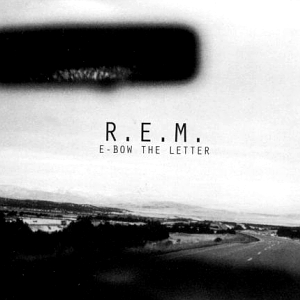
"E-Bow the Letter" is the first single from American rock band R.E.M.'s 10th studio album, New Adventures in Hi-Fi (1996). It was released on August 19, 1996, several weeks before the album's release. During the same month, R.E.M. signed a then record-breaking five-album contract with Warner Bros. Records. The song features American singer-songwriter and "Godmother of Punk" Patti Smith performing backing vocals. Smith was cited as a major influence by band members Michael Stipe and Peter Buck, and she also provided backing vocals for "Blue", the closing track on the band's final studio album, Collapse into Now, in 2011.
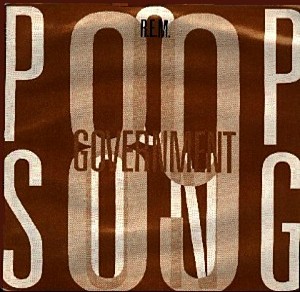
"Pop Song 89" is the opening track and third single released from R.E.M.'s sixth studio album Green. It peaked at number 86 on the Hot 100, and in the UK "Stand" was re-released instead.

"Drive" is a song by American alternative rock band R.E.M. It is the first track on and the lead single from their eighth studio album, Automatic for the People (1992), and was the first song lead singer Michael Stipe wrote on a computer. "Drive" peaked at number 28 on the US Billboard Hot 100, number one on the Billboard Modern Rock Tracks chart, and number two on the Billboard Album Rock Tracks chart. Internationally, "Drive" became R.E.M.'s then second-biggest hit on the UK Singles Charts, peaking at number 11, and their biggest hit in Norway until "Supernatural Superserious" in 2008, reaching number three. Elsewhere, the song reached the top 10 in Canada, Ireland, New Zealand, and Switzerland.

"Bittersweet Me" is a song by American rock band R.E.M., released as the second single from their 10th studio album, New Adventures in Hi-Fi (1996). Like much of the album, the song originated while the band were on the road for the Monster tour, although the song was only ever soundchecked and has never been played live as part of a concert. The song was a bigger hit in the United States than the first single from the album, "E-Bow the Letter", except on the Modern Rock Tracks chart, where the first single's number-two peak bested the number-six peak of "Bittersweet Me".

"Daysleeper" is a song by American alternative rock band R.E.M. It was released as the first single from their eleventh studio album Up on October 12, 1998. Sung from the point of view of a night shift worker corresponding with colleagues, "Daysleeper" focuses on the disorientation of time and circadian rhythm in such a lifestyle, leading to despair and loss of identity. Lead singer Michael Stipe developed the song's concept after noticing a sign reading "daysleeper" on a New York City apartment door.
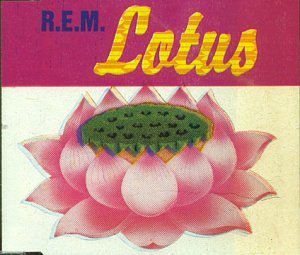
"Lotus" is a song by American rock band R.E.M., released as the second single from their eleventh studio album, Up (1998). The song is somewhat minimalist, with Michael Stipe singing surreal lyrics in a percussive manner. It builds on a four-note keyboard part, with a distorted guitar riff at the beginning and after the second chorus. The song's recurring line "I ate the lotus" appeared in an alternate form in a previous R.E.M. song, "Be Mine". The line "dot dot dot and I feel fine" is a reference to R.E.M.'s 1987 hit "It's the End of the World as We Know It ".

Part Lies, Part Heart, Part Truth, Part Garbage 1982–2011 is a 2011 greatest hits album from alternative rock band R.E.M. Intended as a coda on their career, this is the first compilation album that features both their early work on independent record label I.R.S. Records in addition to their 10 studio releases through Warner Bros. Records. The double-disc retrospective was released through Warner Bros. on November 11, 2011, and was compiled by the band members; the existence of the compilation was revealed simultaneously with the group's announcement that they were disbanding on September 21, 2011.

Green is the sixth studio album by American rock band R.E.M., released on November 7, 1988, by Warner Bros. Records. The second album to be produced by the band and Scott Litt, it continued to explore political issues both in its lyrics and packaging. The band experimented on the album, writing major-key rock songs and incorporating new instruments into their sound including the mandolin, as well as switching their original instruments on other songs.




















